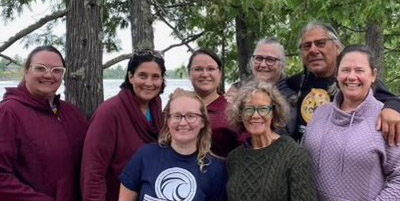LSU Writing Project Participates in Place-Based Writing Retreat
September 05, 2024
BATON ROUGE, LA - The LSU Writing Project held its first place-based Invitational Summer Institute on Mallard Island in the Rainy Lake Watershed, north of International Falls, Minnesota. Margaret-Mary Sulentic Dowell, PhD, director of the LSU Writing Project, submitted a proposal to the Ernest Oberholtzer Foundation to host the week-long writing institute.
 The week-long writing institute intended to generate and share ideas around the necessity
of teaching and learning about water stewardship, environmentalism, and conservation
in terms of the place of the Mississippi River and other significant waterways as
educational spaces in both Louisiana and Minnesota. The Oberholtzer Foundation’s rich
resources on Mallard Island in Rainy Lake catalyzed brainstorming sessions between
participants and written products such as grants, curricula, and writing ideas centered
on place-based learning. A group idea generation session occurred each morning, patterned
after a writing workshop. Each afternoon, participants retreated to locales on the
island to work on concepts from each morning session.
The week-long writing institute intended to generate and share ideas around the necessity
of teaching and learning about water stewardship, environmentalism, and conservation
in terms of the place of the Mississippi River and other significant waterways as
educational spaces in both Louisiana and Minnesota. The Oberholtzer Foundation’s rich
resources on Mallard Island in Rainy Lake catalyzed brainstorming sessions between
participants and written products such as grants, curricula, and writing ideas centered
on place-based learning. A group idea generation session occurred each morning, patterned
after a writing workshop. Each afternoon, participants retreated to locales on the
island to work on concepts from each morning session.
Joining Sulentic Dowell for the week of writing, research, and generative conversations around interdisciplinary connections to water were Bethany Hager, executive director of Louisiana A+ Schools, Hayley Linder, doctoral student in the School of Education, and LSU alumni Alvera McMillan, PhD, educational coordinator of LSU Sea Grant, Brittany Pike, PhD, director of teacher engagement for Cyber.org, and Laurie Salvail, PhD, executive director of Cyber.org.
Their week began as guests of Minneapolis-based visual artist Ellie Kingsbury, who hosted the group at her home and curated a visit to George Floyd Square. During the week, participants engaged in an Anishinaabe Ceremony with Elder Pebaamibines from the Nigigoonsiminikaaning First Nation, located in the Treaty Three Territory in northwestern Ontario. He is the Oberholtzer Foundation’s Elder-in-Residence and the author of Daga Anishinaabemodaa: Let's Speak Ojibwe. On the return trip, participants also visited Voyagers National Park and Minnehaha Falls in Minneapolis.
“The week was extremely productive; we were surrounded by the flora and fauna of Rainy Lake and quite isolated, living and working in rustic structures, free of distractions and modern amenities such as running water and cell phone service,” said Sulentic Dowell. “That isolation fueled our creativity – collectively, we produced seven draft manuscripts, two completed manuscripts, planned three grants, completed one renewal grant, and crafted one leadership plan.”
The LSU Writing Project, established in 1985, is a site of the National Writing Project.
About the LSU Lutrill & Pearl Payne School of Education (SOE)
A school of the College of Human Sciences & Education, the SOE offers undergraduate programs for students who want to pursue a career as a pre-kindergarten through 12th-grade teacher or acquire dual certification in traditional elementary and special education classrooms. In addition, SOE offers 3 graduate certificates, 17 master’s degree program areas, 9 EdS certificate programs, and 2 PhD degrees in 11 areas of focus. SOE’s focus is not only on preparing highly qualified teachers but also on preparing educational leaders, curriculum studies scholars, educational technology experts, applied researchers, higher education professionals, school counselors, and clinical mental health counselors. SOE specializes in scholarly expertise regarding pressing educational and wellness issues across the entire lifespan.
Visit the LSU Lutrill and Pearl Payne School of Education.
About CHSE
The College of Human Sciences & Education (CHSE) is a nationally accredited division of Louisiana State University. The college comprises the School of Education, the School of Information Studies, the School of Kinesiology, the School of Leadership & Human Resource Development, and the School of Social Work. CHSE has two model demonstration schools: the Early Childhood Education Laboratory Preschool, which enrolls birth to age four, and the University Laboratory School, which enrolls kindergarten through grade 12. The college also has four centers and institutes: the Early Childhood Education Institute, the Healthy Aging Research Center, the Leadership Development Institute, and the Social Research & Evaluation Center. The college is committed to achieving the highest standards in teaching, research, and service and improving quality of life across the lifespan.